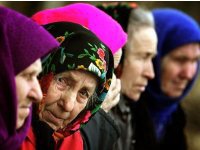Russians may not live up to their 'Swedish' pensions
The Russians were offered a Swedish version of the pension system. However, only in terms of one parameter - the age of retirement. In Sweden today the retirement age is on average 64. The following fact, however, is not taken into account: life expectancy in the Scandinavian counrty is one of the highest in the world, which is not the case in the Russian Federation.

Russia is preparing an ambitious pension reform - by October 1, the government is to submit the final draft to the President. The unity on this issue is not even in sight. The main divide is on two important points: whether to increase the financial burden on businesses, forcing them to pay for early retirees and what age should be considered optimal for retirement.
The debate has been ongoing for three months and now the Committee of Civil Initiatives led by Alexei Kudrin has joined in. "The pension system is not a matter of mere pensions. This is the health of the economy and the financial system of the country, so the problem shall not be narrowed down to one authority," Alexei Kudrin explained his initiative at a round table discussion on the pension reform.
The concept of Kudrin was prepared by the Center for Strategic Research. The President of the Center Mikhail Dmitriev started his speech with the criticism of the Strategy of the pension system of the Russian Federation designed by the Government. "The government's proposals ignore many important issues: flexible retirement age, incentives for those who retire later," said Mikhail Dmitriev.
As an example, he cited the case of Sweden, where the new pension system was introduced in 1995. "There is a mechanism of working towards a higher pension, paid from the age of 65. As a result, many citizens work until at least 64, although the official retirement age starts at 61," Dmitriev praised the Swedes. However, he did not consider that in this country life expectancy is among the highest. In Stockholm, for example, women on average live to 85 years, and men - 83.
Head of the department of Pension Fund of the Russian Federation Arkady Soloviev said: "Although today life expectancy in Russia is increasing, it still has ways to go to the level in Sweden. Besides, the length of survival until retirement in Russia is growing half as fast." That is, an average Russian today has a chance to live to 65, but virtually no chances to live on retirement.
A representative of the Federation of Independent Trade Unions was even tougher. He believes that today infant mortality in the country is decreasing, while life expectancy is growing very slowly, which is favorable for the pension system: "Every child is a future employee, and a high mortality rate on the eve of retirement, or immediately after it, reduced the burden on the pension fund. "
Besides, there is another important point: how the Russians will be able to work to a higher pension even if they live to see it. "According to macroeconomic forecast up to 2030, the number of jobs will be reduced," reminded Arkady Soloviev. Whether seniors will compete for vacancies with younger workers is a rhetorical question.
The government, in turn, did not risk touching the retirement age, with emphasis on early retirees and self-employed. According to the representative of the Pension Fund, in Russia today 30 percent retire early. The Government's proposal is to force businesses to pay twice as much in the budget for those who work in hazardous environments if they do not want to reconstruct them. Mikhail Dmitriev believes that before "milking" employers there is a need to develop a transparent mechanism for job evaluation that has not changed since the last century. It may, in fact, be that there are not that many harmful working environments in Russia.
The Center for Strategic Research also criticized another government initiative: to increase tariff contributions to the Pension Fund for the self-employed. It is assumed that by 2015 they would be increased three-fold. According to Tatiana Omelchenko of CSR, it will have no noticeable effect, because in this case part of small businesses will simply disappear in the shadows.
An interesting fact came up during the discussion. It turns out that the average pension in Russia is close to those in developed countries - 37 percent. In Sweden pension is 40 percent of the salary. In Chechnya this number is exorbitant - 74 percent. However, there is nothing to be happy about because coincidentally in many Russian regions wages are so small that they nearly equal pensions. According to Arkady Soloviev, reaching the level of Sweden in terms of this parameter is possible only in the event that the employee tenure will be at least 30 years, and the salary will then be above the national average. Today, only a small part of the population would meet these parameters.
Svetlana Smetanina
Pravda.Ru
Subscribe to Pravda.Ru Telegram channel, Facebook, RSS!


